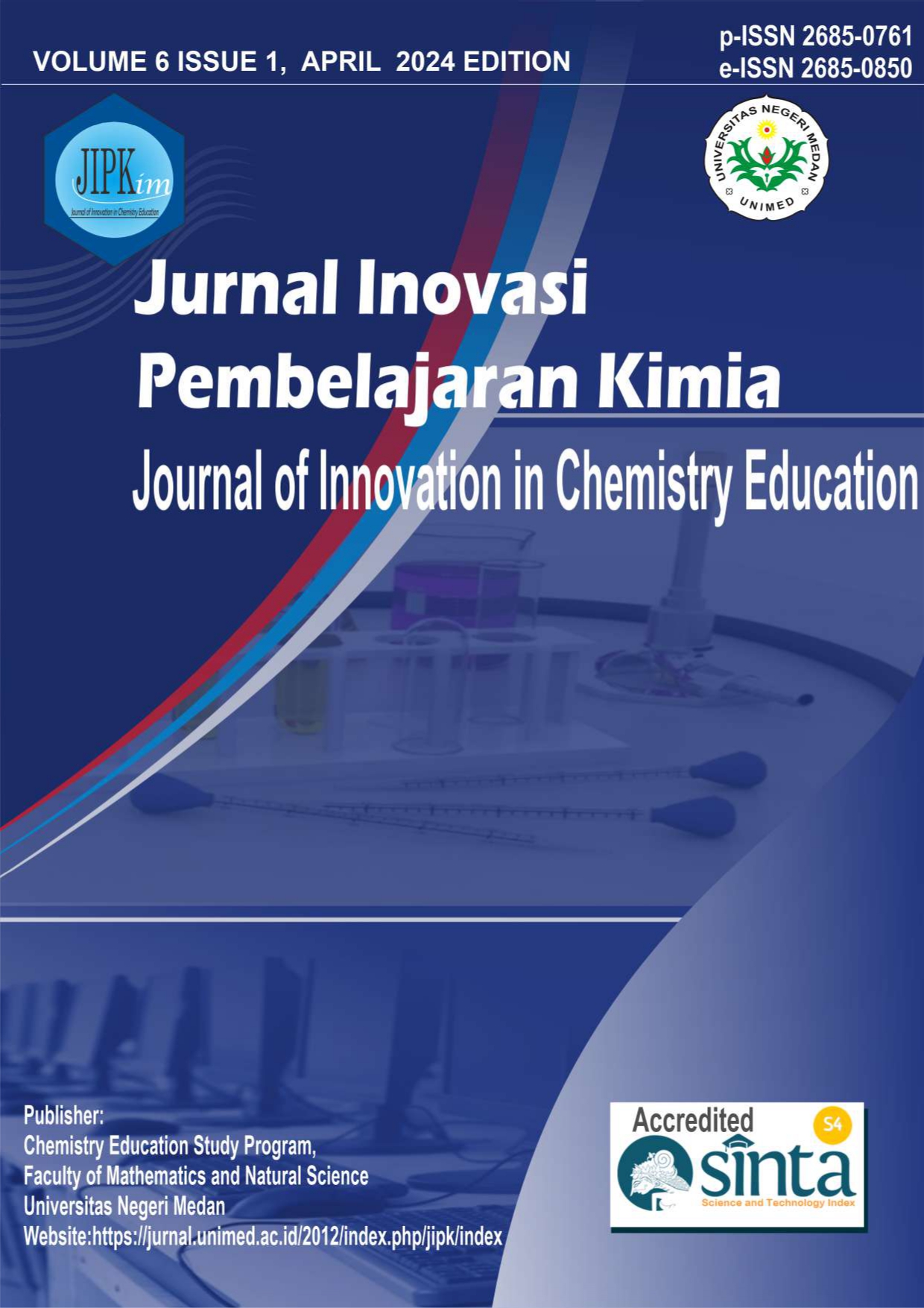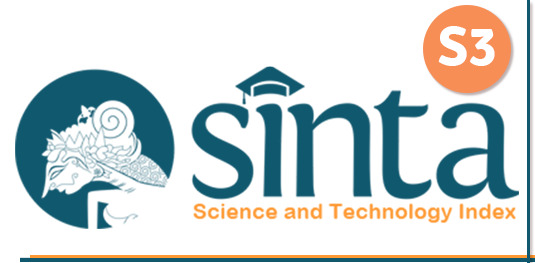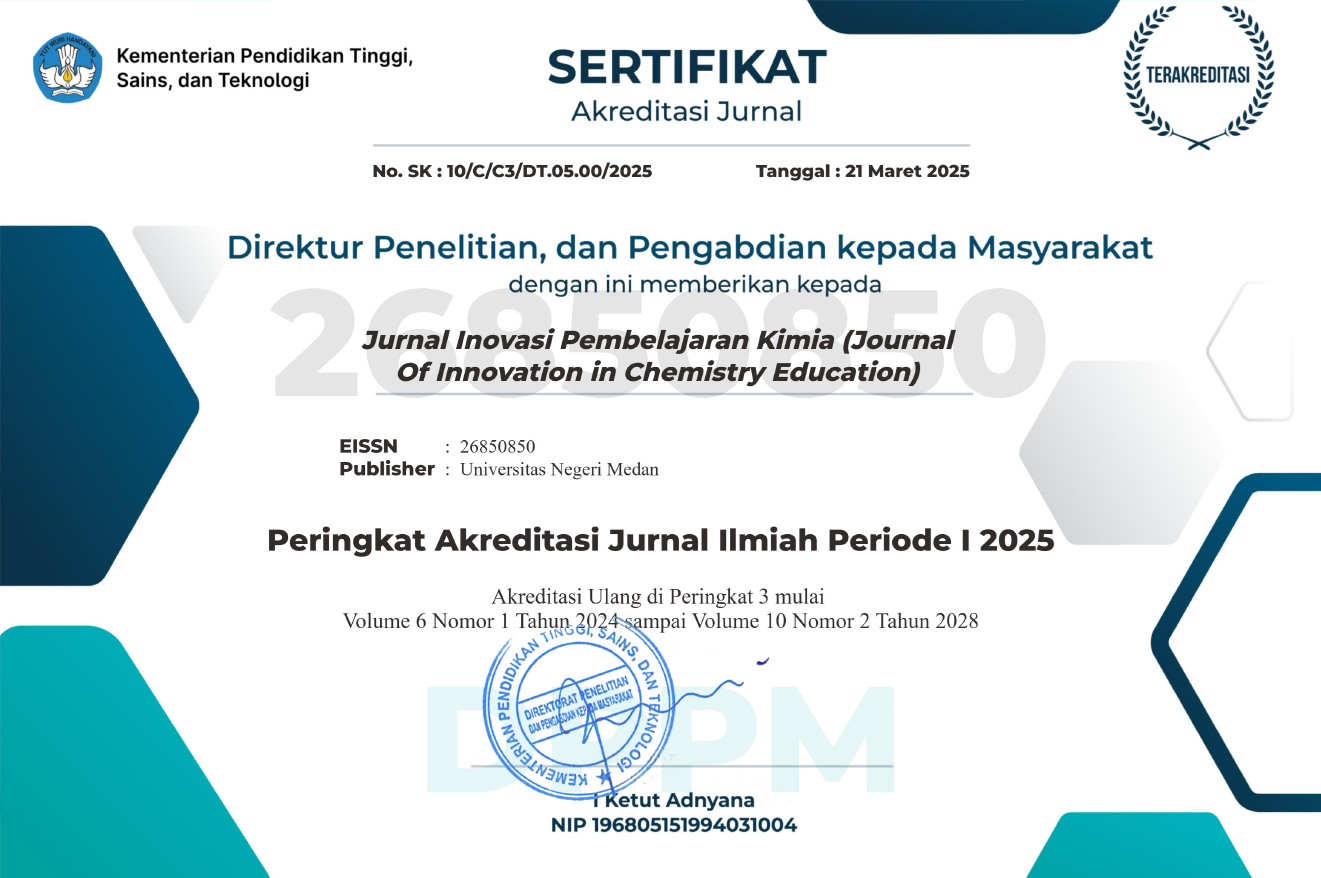Students' Imaginative Skills to Create a Simple Gamification on Chemistry Material
DOI:
https://doi.org/10.24114/jipk.v6i1.57325Keywords:
Gamification, Imaginative Skills, Simple GamificationAbstract
The creativity dimension related to cognitive, affective, psychomotor and other skills aspects. The creativity dimension is closely related to learning outcomes and students' ability to be creative in producing relevant products. One important indicator of the creativity dimension is students' imagination skills. Through good imagination skills, students will be able to predict and create patterns in the content and context of learning material. In this research, an analysis of students' imagination skills will be carried out which consists of three indicators, namely playing with possibilities, making connections, and using intuition. The research was carried out using a classroom action research approach consisting of 3 cycles, where research data was collected by giving a questionnaire consisting of 4 statements for each indicator with 5 options for each research instrument. Apart from the questionnaire method, research data was collected through random interviews and structured observation. Based on data analysis, students' imagination skills were highest in the playing with possibilities indicator at 81.05 in cycle 3. Meanwhile, students' imagination skills were lowest in the using intuitions indicator at 35.75 in cycle 1. In general, simple gamification activities were able to increase students' imagination skills between 10% - 40%.References
Alzahrani, F. K., & Alhalafawy, W. S. (2023). Gamification for Learning Sustainability in the Blackboard System: Motivators and Obstacles from Faculty Members™ Perspectives. Sustainability, 15(5), 1“19. https://doi.org/10.3390/su15054613
Caiman, C., & LundegÃ¥rd, I. (2018). Young Children™s Imagination In Science Education And Education For Sustainability. Cultural Studies of Science Education, 13(3), 687“705. https://doi.org/https://doi.org/10.1007/s11422-017-9811-7
Chen, C. M., Ming-Chaun, L., & Kuo, C. P. (2023). A Game-Based Learning System Based On Octalysis Gamification Framework To Promote Employees™ Japanese Learning. Computers & Education, 205(4), 104899. https://doi.org/10.1016/j.compedu.2023.104899
David, L., & Weinstein, N. (2023). A Gamified Experiential Learning Intervention For Engaging Students Through Satisfying Needs. Journal of Educational Technology Systems, 52(1), 52“72. https://doi.org/https://doi.org/10.1177/00472395231174614
Erol, A., Erol, M., & Basaran, M. (2022). The Effect Of STEAM Education With Tales On Problem Solving And Creativity Skills. European Early Childhood Education Research Journal, 31(2), 243“258. https://doi.org/https://doi.org/10.1080/1350293X.2022.2081347
Harefa, N. (2020). Learning Management System Aplikasi E-Learning Untuk Pembelajaran Online Dan Blended. UKI Press.
Harefa, N., & Purba, L. S. L. (2020). Problem Solving Skills Improvement And The Impact On Students™ Learning Outcomes: Learning Based E-Project. Journal of Physics: Conference Series, 1567(2). https://doi.org/10.1088/1742-6596/1567/2/022038
Harefa, N., Sumiyati, S., & Tamba, R. M. (2024). Students™ Creativity Dimension in Chemistry E-Module Based on Augmented Reality with Project Based Learning Approach. Jurnal Pendidikan Kimia (JPKIM), 16(1), 1“6. https://doi.org/https://doi.org/10.24114/jpkim.v16i1.49649
Harsaya, E. R. T., Permana, A. A., & Khaeruzaman, Y. (2023). Design Application Simple Learn Based on Mobile With Implementation Gamification for Learning Online. Journal Of Theoretical And Applied Information Technology, 101(6), 2255“2258.
Harvey, S., & Berry, J. W. (2023). Toward A Meta-Theory Of Creativity Forms: How Novelty And Usefulness Shape Creativity. Academy of Management Review, 48(3), 504“529. https://doi.org/https://doi.org/10.5465/amr.2020.0110
Hoffmann, J., & Russ, S. W. (2016). Fostering Pretend Play Skills and Creativity in Elementary School Girls: A Group Play Intervention. Psychology of Aesthetics Creativity and the Arts, 10(1), 114“125. https://doi.org/10.1037/aca0000039
Holly, S., Maulik, B., & Samuel, I. (2023). Use of Whatsapp as A Learning Media to Increase Students™ Learning Interest. Scientechno: Journal of Science and Technology, 1(1), 35“48. https://doi.org/10.55849/scientechno.v2i1.57
Kimmel, M., & Groth, C. (2023). What Affords Being Creative? Opportunities For Novelty In Light Of Perception, Embodied Activity, And Imaginative Skill. Adaptive Behavior, June, 1“18. https://doi.org/10.1177/10597123231179488
Luarn, P., Chen, C.-C., & Chiu, Y.-P. (2023). Enhancing Intrinsic Learning Motivation Through Gamification: A Self-Determination Theory Perspective. International Journal of Information and Learning Technology, 40(5), 413“424. https://doi.org/10.1108/IJILT-07-2022-0145
Lucas, B. (2016). A Five-Dimensional Model Of Creativity And Its Assessment In Schools. Applied Measurement In Education,. Applied Measurement in Education, 29(4), 278“290. https://doi.org/http://dx.doi.org/10.1080/08957347.2016.1209206
Lucas, B., Spencer, E., Stoll, L., Fisher-Naylor, D., Richards, N., James, S., & Milne, K. (2023). Creative Thinking in Schools: A Leadership Playbook. Crown House Publishing LLC.
Lyons, R. M., Grace, R., & Simon, S. (2023). Gamification To Enhance Engagement And Higher Order Learning In Entrepreneurial Education. Education+ Training, 65(3), 416“432.
Mavrelos, E., Daradoumis, T., & Arguedas, M. (2023). Exploring The Power Of Imagination: Unravelling Students™ Self-Perception Of Academic Abilities In Imaginative And Traditional Schools In Greece. Education, 3(13), 1“14. https://doi.org/10.1080/03004279.2023.2250357
Oliveira, W., Hamari, J., Shi, L., Toda, A. M., Rodrigues, L., Palomino, P. T., & Isotani, S. (2023). Tailored Gamification in Education: A Literature Review and Future Agenda. Education and Information Technologies, 8(1), 373-406. https://doi.org/10.1007/s10639-022-11122-4
Panggabean, F. T. M., Purba, J., & Sinaga, M. (2021). Pengembangan Pembelajaran Daring Terintegrasi Media Untuk Mengukur HOTS Mahasiswa Pada Mata Kuliah Kimia Organik. Jurnal Inovasi Pembelajaran Kimia (Journal Of Innovation in Chemistry Education), 3(1), 11“21. https://doi.org/10.24114/jipk.v3i1.24298
Panggabean, F. T. M., Silitonga, P. M., Sinaga, M., Sutiani, A., & Purba, J. (2022). Development of General Chemistry Learning Media (Thermochemistry) Using Web Based Learning Model. International Journal of Computer Applications Technology and Research, 11(12), 400“405. https://doi.org/10.7753/ijcatr1112.1001
Parkerson, R. (2023). Five Key Areas To Consider Before Using Gamification In Learning And Development. Strategic HR Review, 22(4), 115“120. https://doi.org/10.1108/SHR-01-2023-0005
Purba, J., Panggabean, F. T. M., & Widarma, A. (2021). Development of General Chemical Teaching Materials (Stoichiometry) in an Integrated Network of Media-Based Higher Order Thinking Skills. Atlantis Press, 591, 949“954. https://doi.org/10.2991/assehr.k.211110.211
Qur™ani, B., Nurhijrah, N., Suryana, S., & Hamsar, I. (2023). Training on making Interesting Percentage Learning Media Using Canva Training of Interesting Learning Media Making Training Using Canva. IMPACTS: International Journal of Empowerment and Community Services, 2(1), 45“51. https://doi.org/10.30738/impacts.v2i1.14507
Simonton, D. K. (2023). The Blind-Variation and Selective-Retention Theory of Creativity: Recent Developments and Current Status of BVSR. Creativity Research Journal, 35(3), 304“323. https://doi.org/10.1080/10400419.2022.2059919
Wang, Y. -H. (2023). Can Gamification Assist Learning? A Study to Design and Explore the Uses of Educational Music Games for Adults and Young Learners. Journal of Educational Computing Research, 60(8), 2015-2035. https://doi.org/10.1177/07356331221098148
West, M. A., & Sacramento, C. A. (2023). Creativity and innovation: The role of team and organizational climate. IN Handbook of Organizational Creativit.
Xiao, Y., & Hew, K. F. T. (2024). Intangible Rewards Versus Tangible Rewards In Gamified Online Learning: Which Promotes Student Intrinsic Motivation, Behavioural Engagement, Cognitive Engagement And Learning Performance? British Journal of Educational Technology, 55(1), 297“317. https://doi.org/10.1111/bjet.13361
Yu, Q., Yu, K., & Li, B. (2024). Can Gamification Enhance Online Learning? Evidence From A Meta-Analysis. Education and Information Technologies, 29(4), 4055“4083. https://doi.org/https://doi.org/10.1007/s10639-023-11977-1













